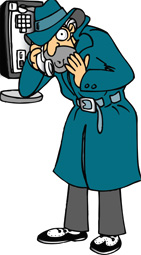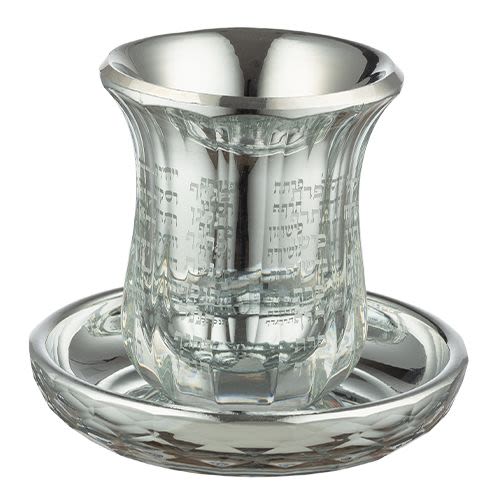
Enemy Agents
Advertising is more dangerous than an enemy spy. The enemy agent penetrates our country, but advertising enables foreign hashkafas to infiltrate our minds...

continued from Smart Shopping, Part 1
The Torah is the most holy object we, as a nation possess, and even the letters used in the Torah (the aleph, beis) are not simple, random letters; they were given to us by Hashem, and are holy. Therefore even the letters have to be treated with the respect due to holy objects.
We, with our limited imagination cannot even begin to fathom the holiness inherent in each letter and every crown written in the Torah. So holy is the Torah and its contents that when a Sefer Torah is transported from one place to another it may not be put into a box or suitcase but must held by someone, with awe and honor and, the entire way. And if Heaven forbid a Sefer Torah falls down it is a terrible calamity and all the men in the shul must fast to atone for the terrible damage done to the honor and the glory of the Torah.
The Torah is the blueprint on which yiddishkeit is based and by which we live our lives, and our nation is a holy nation because the Torah is holy. It teaches us how to behave correctly and live proper lives and when we follow what is written in the Torah we are doing Hashem’s will.
A Sefer Torah must be made up of a specific type of parchment that is consecrated for this purpose, and the words may only be written with a specific ink and a quill exactly as it has been throughout the centuries. The sofer who writes it must himself be a pious individual entrenched in holiness.
When a Sefer Torah is taken out of the ark, all must stand in honour of its holiness, and whilst it is being read everyone must listen quietly as if they were listening to it being read at Har Sinai.
Using the holy words of the Torah as part of advertising does not elevate the item being promoted; it simply devalues the holiness and our awe of the Torah. How can one even think of bringing those holy and precious words down to such a low level?
And if we’re talking about advertising let me tell you about the time I saw an advertisement for a medicine that claimed to solve all your problems!!
The title emblazoned across the top of that particular advertisement was “Life isn’t Simple…..” and featured a frowning, care-worn, middle-aged man with worry lines etched on his face. The answer to all our problems (according to the advertisement) was to buy the medicine being promoted and then all our problems would be solved. My initial reaction to it was to think cynically, “That’s all it takes? Life’s “ills” are solved by taking a few drops of medicine”? (There were no subtle implications this time; the message was clear and unambiguous).
At lunchtime I showed the advertisement to the Rov[1], with the intention of asking him if he thought the public was gullible enough to believe that a few drops of “medicine” could do what it claimed it could.
The Rov was astounded at the negative message portrayed by the picture – and he felt that, like most of current advertising it was a very manipulative advertisement.
Perhaps you realise that advertising is manipulative; even so I’m sure you have never looked at an advertisement the way the Rov does.
According to the Rov the subtle message imparted by all those advertisements are leading us, as Yidden, completely in the wrong direction. We are being subtly brainwashed and bombarded from all directions that there is a “fix” for all our problems. The implication is that if we feel we are missing anything it can be acquired if we will only “possess” this or that.
If a lack of happiness and satisfaction is the problem – well really there is no problem – just buy this car, or that sheitel or those home furnishings, and presto, you will feel “happy and satisfied”.
And if its peace and contentment you’re after: Well, do you remember the cowboy in the Marlboro cigarette advertisement where the innuendo was that if you smoked that particular brand of cigarettes you would find peace and contentment? That advertisement was plastered across English billboards for so long (and even though the actual advertisement seemed to be a very simple one, it was apparently extremely successful) so that even I remember it.
But if you really want to feel you’re “living”, the manufacturers of Coca Cola have been kind enough to tell us how we can achieve even that wonderful feeling. We don’t even have to work it out for ourselves because out of the “goodness of their heart” they have enabled us to access the solution with ease by plastering it across all the billboards here in Eretz Yisroel. Just drink Coca Cola the manufacturers say, because – Coca Cola “is the taste of life”. Halevei it was that easy, we’d all be in paradise by now.
As to the original advertisement that sparked off this discussion, the implication that some medicine could cure all your problems, if that was really true the advertisers would not still need to be advertising their wares because they would be multi-millionaires by now.
We do not even realize how corrosive all those advertisements are. We all know that it’s forbidden to look at unclean pictures, but you might ask, what’s wrong with pictures of a car or a house for instance? It’s not the car or the house that’s wrong, but the presentation of them that’s problematic. Those so-called innocent advertisements are not so innocent at all; they are specifically targeted at our subconscious psyche and the intention is get us to internalize the foreign hashkofoh (philosophy) that possessions will supply that which we are lacking. And we, without even realizing that we are being manipulated, accept the advertisement at “face value”. Even worse, our neshomos (souls) are being attacked by these dangerous “enemy agents.”
So what, according to the Rov, is the real “fix” for our problems? One thing and one thing only:
Emuna: we must recognize that all comes from Hashem.
It is to Him that we need to turn for anything we need – the exact opposite of what those advertisements are implying!
The first thing that we need to realize is that the WHOLE of yiddishkeit (Judaism) is built on the first of the Asseres Hadibros (Ten Commandments) which is, “I am Hashem your God”. What this means is “I Hashem am your G-d who created everything, manages and runs everything (including this world), and gives you everything”.
If we understand and internalize the concept that nothing is random but everything that happens is planned and delivered by Hashem specifically tailor-made for us, then we will live our lives calmly and peacefully, fully aware that Hashem Himself is taking care of us personally; He is leading us in the correct direction and is with us all the way. In this frame of mind we will be able to accept our life’s circumstances and all that happens to us with true מנוחת הנפש (calm soul).
If we live with the reality that “all is from Hashem“ and that whatever we do (or don’t) possess is precisely what Hashem wants us to have and is good for us, we will not feel that we need material “possessions” to make us feel happy, calm and contented; we will be satisfied with whatever we have.
If we accept that any problems we have are not because Hashem does not love us or want us, G-d forbid, but because “there are no troubles without sin”, we will understand that troubles come upon us because of our own shortcomings and that we have fallen short of fulfilling our obligations to Hashem.
In exactly the same way as an earthly father reprimands his child in order to teach him that he has done wrong, so Hashem sends us with troubles and aggravation to remind us that we are not the tsadikim (righteous ones) that we might think we are.
Let’s stop to think if we are actually fulfilling our obligations to Hashem as we really should. Do we really say our morning blessings with true kavonoh, or do we rattle them off by rote? Do we always remember to say the proper blessings after every meal, and with proper kavonoh? And does our beautiful new outfit (or even our other clothes) absolutely fulfill all the dictates of tsni’us (modesty)? And so on…….
I think that if we truly think about this issue, instead of questioning why life is not a bed of roses we will be thanking Hashem from the bottom of our hearts that, as an all-loving, merciful Father, He has mercy on us and does not take into account all the things we do not do properly!
If we really believe that Hashem sends us “difficulties” as a wake-up call, then “all” we need to do is cry out to Hashem for relief and work o n improving our performance of mitzvos and being better Yidden.
n improving our performance of mitzvos and being better Yidden.
 n improving our performance of mitzvos and being better Yidden.
n improving our performance of mitzvos and being better Yidden.Do you know what I realized after hearing all this from the Rov? That even though I believe I do live with this concept, I, no less than everyone else, have to a certain extent internalized precisely what the producers of all those advertisements wanted me to. If anything, the talk I had with the Rov was worthwhile for me alone and hopefully I now know the truth even better.
And next time you look at advertisements look at them through the prism of yiddishkeit and emuna; you will certainly look at them differently. With the war going on, we have to be extra careful: Advertising is more dangerous than an enemy spy. The enemy spy penetrates our country, but advertising enables foreign hashkafas to infiltrate and contaminate our minds. Happy shopping!
* * *
[1]When the Rebbetzen mentions the “Rov”, she is referring to her husband, the Melitzer Rebbe shlit’a.










Tell us what you think!
Thank you for your comment!
It will be published after approval by the Editor.